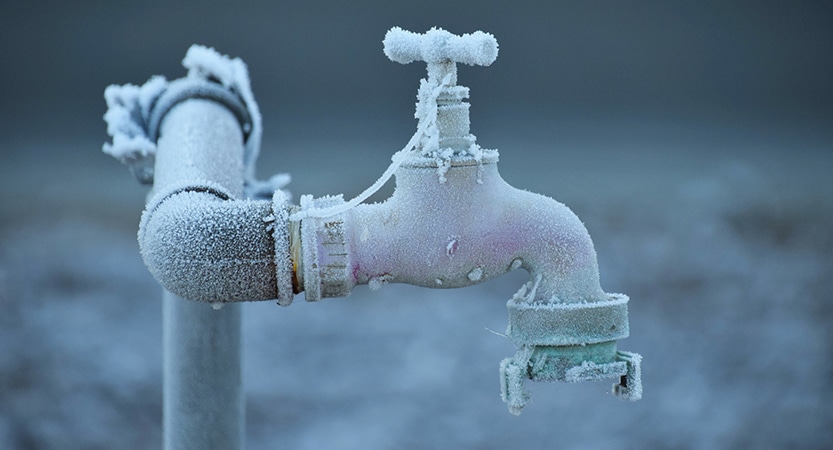Tips to Maintain Your Pipes from Freezing Damage: Important Guidance
Tips to Maintain Your Pipes from Freezing Damage: Important Guidance
Blog Article
Just how do you feel on the subject of Winter Plumbing Precautions: Preventing Frozen Pipes?

Winter can ruin your pipes, specifically by freezing pipes. Right here's just how to avoid it from happening and what to do if it does.
Introduction
As temperature levels drop, the risk of icy pipelines boosts, potentially resulting in costly fixings and water damages. Comprehending how to stop frozen pipes is critical for house owners in cold environments.
Understanding Icy Pipes
What creates pipes to ice up?
Pipes freeze when revealed to temperatures listed below 32 ° F (0 ° C) for expanded durations. As water inside the pipelines ices up, it increases, taxing the pipeline wall surfaces and possibly creating them to break.
Threats and problems
Frozen pipes can cause water system interruptions, building damages, and costly repair work. Ruptured pipelines can flood homes and create considerable structural damage.
Indications of Frozen Pipeline
Identifying frozen pipes early can avoid them from breaking.
Just how to determine frozen pipes
Seek reduced water flow from taps, unusual smells or noises from pipelines, and visible frost on exposed pipelines.
Avoidance Tips
Protecting vulnerable pipes
Wrap pipes in insulation sleeves or use heat tape to protect them from freezing temperature levels. Concentrate on pipelines in unheated or external locations of the home.
Heating techniques
Maintain interior spaces properly warmed, particularly areas with pipes. Open closet doors to enable cozy air to distribute around pipelines under sinks.
Securing Outdoor Pipes
Yard hose pipes and exterior faucets
Separate and drain garden tubes before winter months. Install frost-proof faucets or cover outdoor faucets with shielded caps.
What to Do If Your Pipelines Freeze
Immediate actions to take
If you presume icy pipelines, keep faucets available to soothe stress as the ice melts. Make use of a hairdryer or towels soaked in hot water to thaw pipes slowly.
Long-Term Solutions
Structural modifications
Take into consideration rerouting pipes away from exterior walls or unheated locations. Include additional insulation to attics, basements, and crawl spaces.
Updating insulation
Buy top quality insulation for pipes, attic rooms, and walls. Correct insulation assists maintain constant temperatures and lowers the risk of icy pipes.
Verdict
Avoiding icy pipes needs aggressive steps and fast responses. By comprehending the reasons, signs, and preventive measures, house owners can protect their plumbing during winter.
Helpful Tips to Prevent Frozen Pipes this Winter
UNDERSTANDING THE BASICS: WHY PIPES FREEZE AND WHY IT’S A PROBLEM
Water freezing inside pipes is common during the winter months, but understanding why pipes freeze, and the potential problems it can cause is crucial in preventing such incidents. This section will delve into the basics of why pipes freeze and the associated problems that may arise.
THE SCIENCE BEHIND FROZEN PIPES
When water reaches freezing temperatures, it undergoes a physical transformation and solidifies into ice. This expansion of water as it freezes is the primary reason pipes can burst. As the water inside the pipe freezes, it expands, creating immense pressure on the walls. If the pressure becomes too great, the pipe can crack or rupture, leading to leaks and water damage.
FACTORS THAT CONTRIBUTE TO PIPE FREEZING
Low Temperatures: Extremely cold weather, especially below freezing, increases the risk of pipes freezing. Uninsulated or Poorly Insulated Pipes: Pipes located in unheated areas, such as basements, crawl spaces, or attics, are more prone to freezing. Insufficient insulation or lack of insulation altogether exacerbates the problem. Exterior Wall Exposure: Pipes running along exterior walls are susceptible to freezing as they encounter colder temperatures outside. Lack of Heating or Temperature Regulation: Inadequate heating or inconsistent temperature control in your home can contribute to frozen pipes. PROBLEMS CAUSED BY FROZEN PIPES
- Pipe Bursting: As mentioned earlier, the expansion of water as it freezes can cause pipes to burst, resulting in significant water damage.
- Water Damage: When pipes burst, it can lead to flooding and water damage to your property, including walls, ceilings, flooring, and personal belongings.
- Structural Damage: Prolonged exposure to water from burst pipes can compromise the structural integrity of your home, leading to costly repairs.
- Mold and Mildew Growth: Excess moisture from water damage can create a favorable environment for mold and mildew growth, posing health risks to occupants.
- Disrupted Water Supply: Frozen pipes can also result in a complete or partial loss of water supply until the issue is resolved.
WHY CERTAIN PIPES ARE MORE PRONE TO FREEZING
- Location: Pipes located in unheated or poorly insulated areas, such as basements, crawl spaces, attics, or exterior walls, are at higher risk of freezing.
- Exterior Pipes: Outdoor pipes, such as those used for irrigation or exposed plumbing, are particularly vulnerable to freezing as they are directly exposed to the elements.
- Supply Lines: Pipes that carry water from the main water supply into your home, including the main water line, are critical to protect as freezing in these lines can affect your entire plumbing system.
- Underground Pipes: Pipes buried underground, such as those connected to sprinkler systems or outdoor faucets, can be susceptible to freezing if not properly insulated.
https://busybusy.com/blog/helpful-tips-to-prevent-frozen-pipes-this-winter/

Do you appreciate reading up on Winter Plumbing Precautions: Preventing Frozen Pipes? Write feedback down the page. We would be delighted to listen to your opinion about this blog posting. Hoping to see you back again soon. So long as you enjoyed our article if you please don't forget to share it. Thanks for your time. Kindly check up our site back soon.
Click Here To Find Out More Report this page